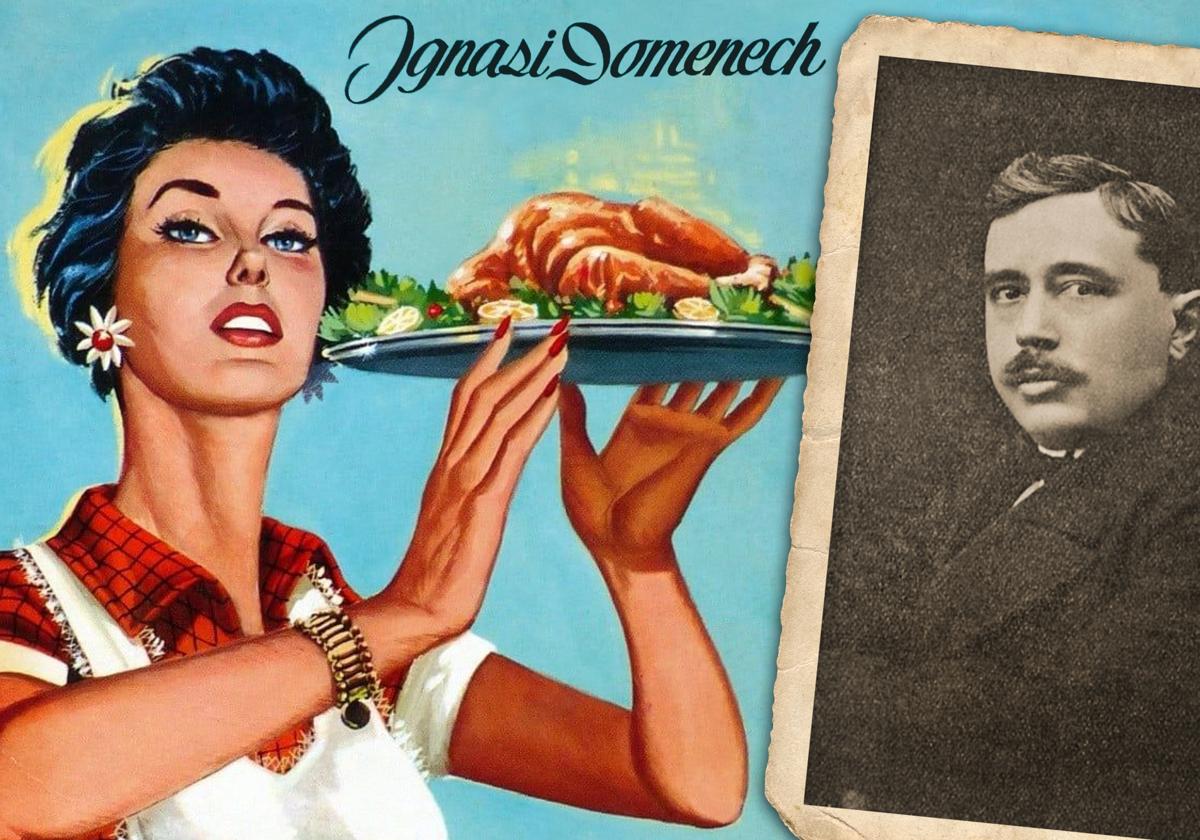

Sections
Services
Highlight

Ana Vega Pérez de Arlucea
Viernes, 6 de septiembre 2024, 00:05
Gratitude is a virtue. Especially when you are forgetful or terrible with dates, like me, and invariably forget all important anniversaries. The credit for remembering today's milestone goes to Berta Álvarez Acal, author of 'War Recipes' (Kailas), who elegantly notes at the end of her book: "The first edition was finished printing in April 2024, one hundred and fifty years after the birth of Catalan chef and gastronome Ignacio Domènech."
Indeed, this Sunday, September 8th, marks the 150th anniversary of the birth of Ignacio (or Ignasi, if you prefer) Domènech Puigcercós, a superlative chef and extremely prolific author whom we have often mentioned on this page but to whom we have never dedicated an exclusive article. I am not one to lecture anyone on memory, but it is striking that no event or tribute is planned to commemorate someone who was a champion of traditional Catalan gastronomy and probably the most influential Spanish chef of the 20th century.
Among the many milestones of his career, we could highlight that he was a disciple of Auguste Escoffier, the father of modern haute cuisine, that he directed several specialized magazines, published dozens of recipe books, and was the founder and professor of Spain's first hospitality school. Although he worked in various restaurants and hotels (some as prominent as the Savoy in London), he excelled in organizing banquets and serving as a private chef for diplomats and aristocrats. This is probably what sets him apart from today's chefs, who gain their fame through stars and lists.
Ignacio Domènech never appeared in the Michelin Guide, but he did not need it to become the most admired chef of his time. He was also the most literary and erudite among them, with permission from his great friend and collaborator Teodoro Bardají (1882-1958). According to Bardají's account in the prologue to one of Domènech's books ('Appetizers and Tea Time', 1946), they became friends in the reading room of the National Library.
The year is 1900, and there are no cooking schools, culinary universities, or certainly no internet. Culinary knowledge is acquired through observation, practice, and reading. The most eager apprentices spend what they do not have on foreign recipe books or magazines like the French 'La cuisine française et étrangère' and pilgrimage to the few public libraries that have interesting books. Ignacio and Teodoro always requested the same ones at the National Library, so assuming a shared affinity or profession, they struck up a conversation one day as they left the building. Together they would change the course of Spanish gastronomy both in haute cuisine and at home kitchens.
With Domènech at the helm and Bardají in support, two magazines aimed at culinary professionals were published: first 'The Elegant Kitchen' (1904) and then 'The White Hat' from 1906 until 1946. They also organized cooking competitions, devised recipes, taught classes, and participated in countless other projects.
They also shared similar trajectories and difficult beginnings. As Domènech wrote in his memoirs — still unpublished — he was born on September 8th, 1874 in Manresa amidst the noise of bullets from the Third Carlist War. His mother died that same day due to childbirth complications, and his father remarried shortly after. "Everything my father had in kindness, my stepmother had in malice; thanks to my mother's brother and sister who constantly watched over how she treated me, especially my godfather Ignacio Puigcercós who owned Manresa's popular Fonda del Centro, they convinced my father to take me to live with them at the inn."
After an "extremely unpleasant and bitter" childhood, Ignacio felt he was in heaven with his uncles. At age 10 he began helping at the inn with simple tasks like stoking the fire, cleaning vegetables, or preparing salads. From his uncle Ignacio and his wife Antonia Cisa he learned the basics of cooking and a love for traditional gastronomy that never left him despite his time in France and England or his success as a high-profile chef.
At age 14, Domènech left Manresa for Barcelona to begin his culinary journey from scratch: from the bottom up. "I earned my first pesetas frying pieces of codfish, pickled sardines, meat in sauce, and other delicacies at a tavern in Plaza de Palacio in Barcelona for a clientele made up of port carters."
He went through humble taverns, third-rate inns, and small eateries slowly climbing up the culinary ladder. He memorized recipes he saw being made and read everything he could get his hands on. That young man would go on to write about thirty cookbooks and be considered (in Vázquez Montalbán's opinion) "the Menéndez Pelayo of Spanish culinary literature." Next week I will tell you how it all happened.
Publicidad
Publicidad
Te puede interesar
Publicidad
Publicidad
Esta funcionalidad es exclusiva para registrados.
Reporta un error en esta noticia

Debido a un error no hemos podido dar de alta tu suscripción.
Por favor, ponte en contacto con Atención al Cliente.

¡Bienvenido a TODOALICANTE!

Tu suscripción con Google se ha realizado correctamente, pero ya tenías otra suscripción activa en TODOALICANTE.
Déjanos tus datos y nos pondremos en contacto contigo para analizar tu caso

¡Tu suscripción con Google se ha realizado correctamente!
La compra se ha asociado al siguiente email
Comentar es una ventaja exclusiva para registrados
¿Ya eres registrado?
Inicia sesiónNecesitas ser suscriptor para poder votar.